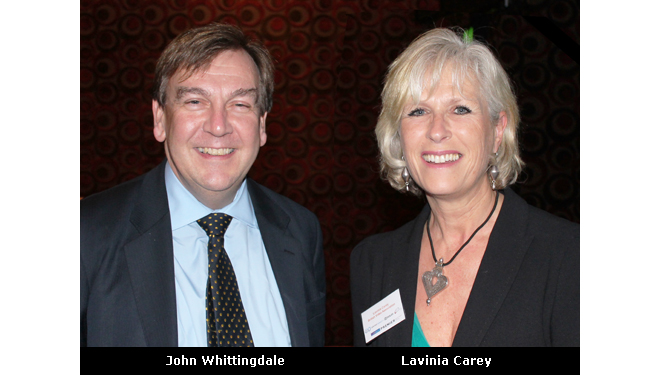Europe's online source of news, data & analysis for professionals involved in packaged media and new delivery technologies

Culture Chair stresses government's IP commitment at BVA annual gathering
John Whittingdale MP, Chair of the Culture, Media and Sports Select Committee, addressed 150 industry leaders at the British Video Association's 32nd Annual General Meeting in London last week. He stressed the importance of the government commitment to intellectual property and praised the recent launch of the new industry portal, The Content Map (see).
"Our audiovisual industry is second to none, with some of the greatest TV shows and films being produced in the UK, such as Downton Abbey, Harry Potter, James Bond and Dr. Who to name, but a few," says Whittingdale. "However, in order for it to continue to thrive, the government must recognise the importance of intellectual property to the future creation of best-selling work and the negative impact that diluted copyright law will have on the industry as a whole."
Commenting on her 2012 news review, Lavinia Carey, Director-General of the BVA, reflected on a year of rapid change for the video industry, which has seen increasing numbers of viewers take up digital video services from a growing range of new platforms, enabling audiences to access video entertainment in more ways than ever before.
"The BVA has continued to encourage the media and politicians to recognise that physical and digital content are not in competition with each other, but rather co-exist, delivering video entertainment to viewers in ways that suit their lifestyles both at home and on the move," said Carey.
The BVA Secretary General reminded that audiences spend more than twice as much on video entertainment as they do on going to the cinema. The video entertainment industry is the largest single source of funds for film producers, generating on average 47% of revenues and a third of revenues for television series and features, according to a survey carried out by Oxford Economics for the BVA.
"As video entertainment is the primary method that audiences pay to watch films in the UK, it is essential that we can provide consumers with new and accessible services to meet their needs. The industry as a whole must therefore continue to engage with Parliamentarians and opinion formers to ensure that the sector is not undermined by detrimental legislation or the effects of copyright theft," Carey concluded.

Lavinia Carey: You are a champion of the creative industry and the audiovisual sector, where does this interest come from?
John Whittingdale: I like music and I like movies. I was elected to Parliament in 1992. The media industry was changing drastically. It was the very beginning of the Internet and it was clear that things were going to change rapidly. It was going to present great challenges to policymakers. I therefore decided to take a close interest to the sector and, in one capacity or another, that's what I have been doing ever since.
My earliest job was as a special advisor to the Secretary for Trade and Industry. At that time we had a heated debate about a blank tape levy. This is when I started thinking about copyright issues. There was a furious debate whether or not there should be a levy on cassette tapes because of the damage they were doing to the music industry through illegal copying. Though the idea of putting a tape into your machine and record the top 6 or top 20 music on a Sunday evening now appears antiquated, it is the same argument which is still being debated today about illegal download.
True, but despite these challenges, the creative industry has been very successful. To what do you attribute this continuing success?
There is no question this country has always been very strong creatively, going back to the great artists, composers, actors and musicians. It is something we are incredibly good at. For a very small country in a very large world, our influence is phenomenal going back many years. That is why the creative industry is such a significant part of our industrial output, especially as manufacturing has moved offshore to low-cost countries. But creativity is not something we can switch to another country if it is not there. That is one of the great strengths of this country.
You launched an inquiry through your committee into how the creative industry could be supported in the future. Without pre-empting its content what do you think the report will recommend?
We are looking at different areas where the government can help creative industries. We received evidences right across the board. We had sessions with Pinewood Studios and The Design Council, amongst others. I visiting Discovery at its European headquarters in Chiswick where they produced programmes which go across half the world, from Russia to South Africa, all coming out of Chiswick! It is remarkable that companies choose to come here. In terms of what the government can do to ensure it continues to happen, we have identified four or five areas where it has a role.
One clearly relates to intellectual property rights. There needs to be clear entitlements to remuneration for creators though copyright and IP. That is a prominent feature of the enquiry.
Another area is tax breaks. In March of this year, the Chancellor of the Exchequer introduced a tax relief for the video games, high-end drama, and animation industries (read article). This comes on top of a tax break for the film industry. I think that is a very important move.
As Chair of the electronics game group in Parliament, I went to see the financial secretary about six months ago with a few colleagues to try to persuade him to bring a similar tax break to the video game industry. It is excellent news that he has done that.
Skills allocation is another area of interest. We have to make sure we still have the right people coming through. We need people with the necessary IT skills. That is something we will be looking at.
There is also an interesting idea around hubs, where clusters of two or three peer companies encourage others to grow, to relocate. There are a few examples where this is happening.
As regards the reports that focus on IP [Professor Hargreaves' review of intellectual property, published in May 2011, and Richard Hooper's Copyright Works report, published in July 2012,] (read article) have they been heard in high places and do you have confidence that their recommendations have been taken on board?
We have an opportunity to see heightened interest in these issues as we have a new Minister for Intellectual Property, Lord Marland. I already had an informal conversation with him. He is very determined to quickly get to grips with it. I think you went to see him as well. I will bring colleagues with me in a formal meeting to discuss the recommendations we made. We want to make sure he grasps the complexity of the issues. Copyright law is a difficult subject.
One of your All-Party group member Mike Weatherley recently announced the winners of the Film The House, the initiative he launched [to get more MPs to understand the value of copyright]. I wonder if there is anything else the industry should be doing to grow the general understanding and awareness of copyright issues amongst the politicians.
Mike's initiative with Film The House came on the back of his first initiative, Rock The House, which he launched two years ago targeting the music industry. Anything like that which gets MPs acquainted with the issues is highly recommended. The strength of your industry is that you have a lot of glamorous people. MPs are like anyone else, they enjoy meeting stars. Anything you can do to entice MPs along these lines is good. Keep talking to them about the importance of copyright, give them a hard sell.
Do you think we need to deploy these activities outside of Wesminster? My sense is that Brussels is a bit of a problem.
There is no question Brussels is a problem. In all sorts of way, Brussels is always a problem. Where is Brussels not a problem? There are moves about copyrights, though that requires our attention. They were raised with me when I was visiting Discovery. There are concerns about what EU Commissioners are saying. Yes, you need to focus your efforts there as well.
There seem to be this obsession in Brussels about creating the next Google, an obsession that started here, in fact. This is a theme we tackled at last year's AGM, so it is not going away. No particular concern seem to be expressed that it might come at the expenses of our world renowned creative industries. Do you think a lot of politicians have a false sense of security about it, about what we can really do, and whether it matters?
Google hasn't had a great week, have they. They were pilloried along with others in front of the Public Accounts Committee about their tax arrangements. Actually, that is quite an important issue because a lot of these guys like Google make little contribution to the UK economy. That is in contrast with the UK creative industries, as we know, which make a fantastic contribution.
So, when [Chancellor of the Exchequer] George Osborne talks about the growth agenda and at the same time commission the Hargreaves review it certainly tells me that there is a recognition the creative industries make a substantial contribution to the overall economy and thus should be supported rather than left to be diluted. We very much promote that idea. The debate is quite alive. There is a bill going through Parliament that causes anxiety at this moment about some of its provisions.
At the same time, there are some good initiatives like Richard Hooper's Digital Copyright Exchange, built on his Copyright Works report. People I talk to are encouraged that Hooper "gets it." He is generally trying to produce something which benefits the industry.
BVA New Review 2012: watch the video.
Story filed 19.11.12




















